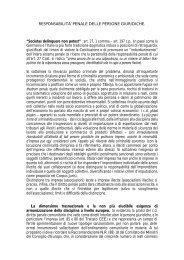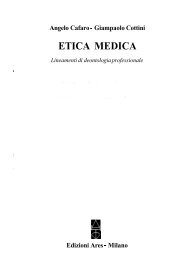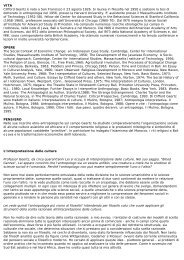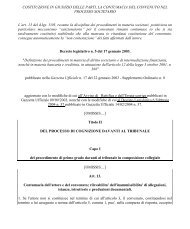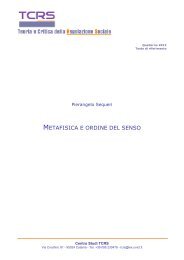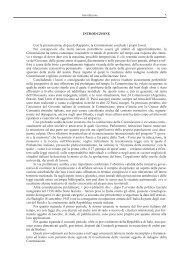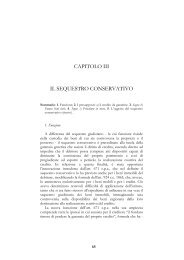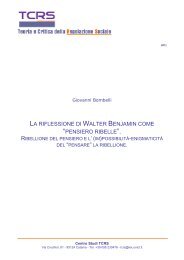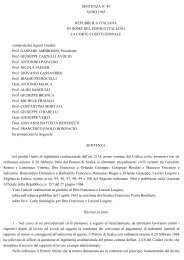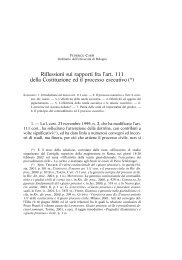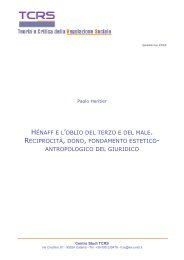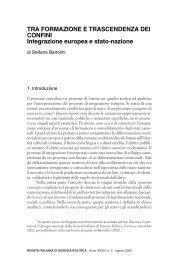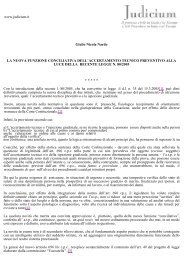FOGLI DI LAVORO per il Diritto internazionale 3 ... - Giurisprudenza
FOGLI DI LAVORO per il Diritto internazionale 3 ... - Giurisprudenza
FOGLI DI LAVORO per il Diritto internazionale 3 ... - Giurisprudenza
You also want an ePaper? Increase the reach of your titles
YUMPU automatically turns print PDFs into web optimized ePapers that Google loves.
210<br />
<strong>FOGLI</strong> <strong>DI</strong> <strong>LAVORO</strong> <strong>per</strong> <strong>il</strong> <strong>Diritto</strong> <strong>internazionale</strong> 3/2008<br />
PARTLY <strong>DI</strong>SSENTING OPINION OF<br />
JUDGE LAZAROVA TRAJKOVSKA<br />
Unfortunately, I cannot share the opinion of the majority of<br />
my Fifth Section colleagues, and it is regrettable that they could<br />
not accept my views on the scope of Article 9. I find a violation<br />
of the applicant's rights under Article 9 of the Convention.<br />
I w<strong>il</strong>l start by referring to the Court's settled case-law to the<br />
effect that freedom of thought, conscience and religion, as<br />
enshrined in Article 9, is one of the foundations of a<br />
“democratic society” within the meaning of the Convention.<br />
Here I w<strong>il</strong>l mention the cases of Metropolitan Church of<br />
Bessarabia and others v. Moldova (no. 45701/99, § 113, ECHR<br />
2001-XII) and Kokkinakis v. Greece (judgment of 25 May 1993,<br />
§ 31, Series A no. 260-A). The Court has also said that in a<br />
democratic society in which several religions coexist within the<br />
same population, it may be necessary to place restrictions on this<br />
freedom in order to reconc<strong>il</strong>e the interests of the various groups<br />
and to ensure that everyone's beliefs are respected (see<br />
Kokkinakis, cited above, § 33).<br />
In the light of Article 9 of the Convention, religious pluralism<br />
is an important part of a democratic society. Freedom of<br />
thought, conscience and religion is also freedom to hold or not<br />
to hold religious beliefs and to practise or not to practise a<br />
religion (see Kokkinakis v. Greece, and Buscarini and Others v.<br />
San Marino [GC], no. 24645/94, § 34, ECHR 1999-I). The<br />
Convention clearly stipulates that this right includes also the<br />
right to manifest religious belief, in worship, teaching, practice<br />
and observance.<br />
However, in exercising its regulatory power in this sphere<br />
and in its relations with the various religions, denominations and<br />
beliefs, the State has a duty to remain neutral and impartial. It is<br />
this Court that established (see Serif v. Greece, no. 38178/97, §<br />
53, ECHR 1999-IX) that the role of the authorities is to ensure<br />
that the competing groups tolerate each other. This is with the<br />
idea that only by neutral and impartial behaviour w<strong>il</strong>l a State<br />
preserve pluralism and the pro<strong>per</strong> functioning of democracy.<br />
In this particular case (Leela Förderkreis E.V. and Others v.<br />
Germany) the interference of the Government lay in not<br />
observing the requirement of neutrality in the exercise of their



